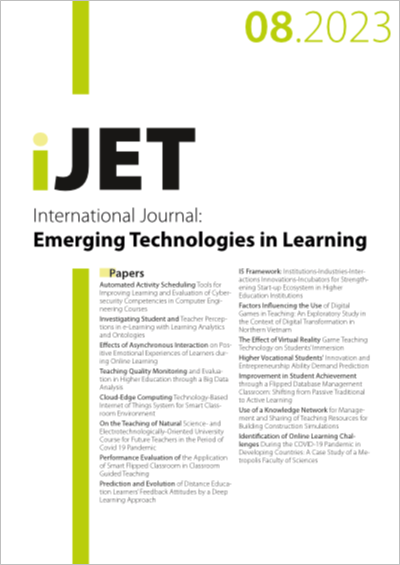Automated Activity Scheduling Tools for Improving Learning and Evaluation of Cybersecurity Competencies in Computer Engineering Courses
DOI:
https://doi.org/10.3991/ijet.v18i08.34879Keywords:
cybersecurity, computer engineering, competencies, learning by doing, evaluation, automated schedulingAbstract
In the last ten years, many different innovative learning methodologies have been proposed for engineering education. In those new approaches, students learning, and evaluation are usually supported by a catalogue of creative activities, practices, and presentations which may be very numerous if competencies to be acquired are heterogeneous and must cover a large knowledge area, such as in cybersecurity courses. In addition, when a high number of students are enrolled in the course, deadlines must be strict, to enable professors to evaluate all students and activities properly and on time. Due to this requiring schedule, students often cannot work all competencies with the expected depth, and their learning decreases. New instruments are needed to facilitate the learning of the students and the evaluation process are needed. Therefore, in this paper we proposed a new automated scheduling tool, based on graph theory, to fill this gap. The tool employs graph coloring algorithms to calculate all possible schedules for evaluation activities. Students may freely choose the schedule that best fits their personal situation, learning progress, background, etc. using a web portal where all solutions from the coloring algorithm are displayed. This tool was deployed in the Computer Engineering degree at Universidad Politécnica de Madrid, Spain. A pilot experience was conducted for three years (2020-2022) in the context of a cybersecurity course to analyze how this new tool improves the learning and the evaluation process of students. Results show both academic results and the students’ and professor’ satisfaction improve in a significant manner.
Downloads
Published
How to Cite
Issue
Section
License
Copyright (c) 2023 Borja Bordel Sánchez, Ramón Alcarria, Tomás Robles

This work is licensed under a Creative Commons Attribution 4.0 International License.


